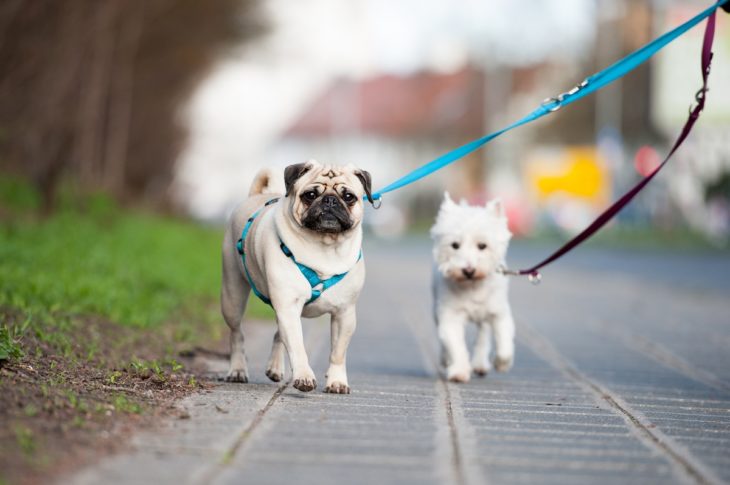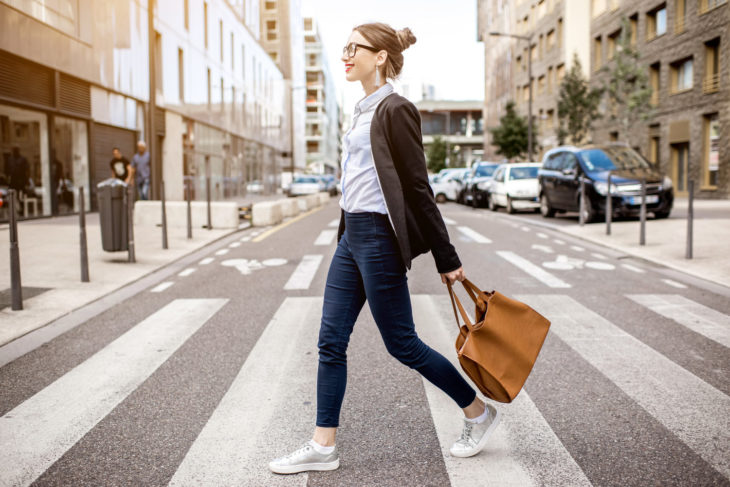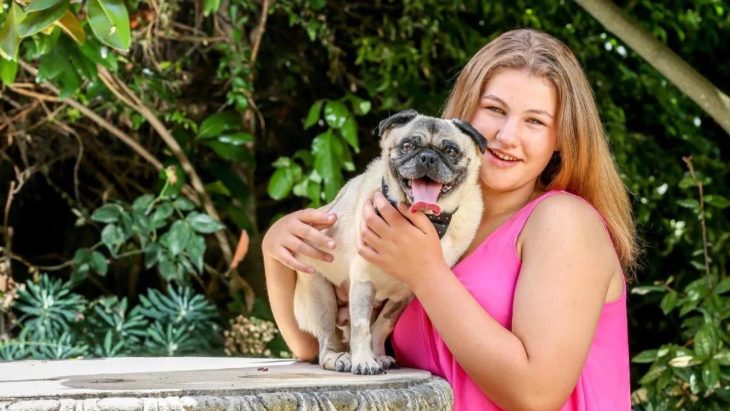Men check out my dog more than me. I only wish I were kidding.
I’ve gotten used to catching unexpected smiles creep onto strangers’ faces while gazing at Henny (why yes, she does look like a bear cub). But after one of our daily walks last month, during which I passed four men in their 30s and noticed, with sinking resignation, that THEY ALL BEAMED ADORINGLY AT MY DOG WITHOUT EVEN A CURSORY GLANCE AT ME, I realized: something is changing. I’m changing.
In January, I will turn 38. Is all that insidious bullshit about aging that the media’s always spewed at us actually true? Am I past my sell-by date? Am I destined to rot away in a dusty corner of Now-Invisible, Once-Pretty? Will I never again experience the tiny thrill of exchanging charged looks with a hot stranger on the street? (This isn’t to say that I enjoy street harassment, catcalls, or overt perv-ery; I do not.)

Source: SmileyDogs
Let me state upfront that, as an unabashed feminist, I generally care more about what women think than men — not because I loathe men (I read them, I watch them, I date them, and occasionally I even do maniacal things like fall in love with them), but because I’ve been listening to The Male Opinion all my life. By now, I’m sick of treating those opinions like they’re the be-all, end-all of my happiness. Growing up, men held the cards explaining what I should or shouldn’t, could or couldn’t, do. They’ve always been the ones talking; we girls were told to shut up and listen. We’re not supposed to argue; we’re supposed to compromise. We’re not supposed to question; we’re supposed to accept. I was shown that no matter how much men dehumanized, disrespected, or simply failed to encourage me because I was female, my worth still depended on their approval — and their approval, it seemed, had a lot to do with how I looked. As women, our most meaningful measure of validation was being deemed beautiful — or at least fuckable — by The Opinions that mattered: men’s.
When I was young, I bought into all that without any critical awareness of the damage it would cause. At 12 or 13, I remember an undercurrent of competition that started silently polluting my friendships. As soon as I caught on to the fact that (usually older) guys were beginning to scope us out, I began keeping score of how many “looks” my friends and I would individually get on the street. Walking around Georgetown with my BFF on a sunny Saturday afternoon, I’d silently count and compare. Sometimes, when I came up short, I’d feel so useless and unseen that my entire day was ruined. (John Berger, in his groundbreaking book Ways of Seeing, sums up the dramatic affront of feeling unseen as a woman: “Men act and women appear. Men look at women. Women watch themselves being looked at. This determines not only most relations between men and women but also the relation of women to themselves.”)

Source: the LifeStart Blog
I was painfully insecure and rather inexperienced in high school, but things changed when I got to college. Suddenly lots of guys my own age were looking at me. I treated each new bedpost notch like a fresh piece of irrefutable evidence that I was finally Good Enough.
A friend of a friend called me “sexy” while we were making out? Add 10 points to my scorecard!
Hooked up with the hottest guy in my dorm? Give this girl a gold star!
Passing frat boy told me I should “major in modeling”?
File that “compliment” into my Inarguable Proof of Hotness archive!
If I could have worn all those little purported victories like medals on my jacket, I would have. If I could have added them to a Resume of Feminine Success and handed them out to strangers to prove I’d passed society’s Beauty Test, I would have done that, too.
But as I grew up and got acquainted with feminism, I began consciously trying to embrace the radical notion that my sense of self-worth was entirely up to me. It needn’t hinge on anything related to how men might judge or “see” me. I finally realized all their judgments were nothing more than opinions: trite, subjective, personal. My looks had nothing to do with how skilled or smart or brave or compassionate I was. My looks — and men’s response to them — weren’t me. Allowing my self-esteem to rest on something so changeable and arbitrary would be setting myself up to feel anxious and paranoid forever. Self-esteem, I learned in a 12-step program in my late 20s, comes from committing “esteemable acts,” not from creams or serums or appreciative glances on the street.
Still, I’m human. It’s not always easy to ignore the shiver of fear that as I age, my physical allure — and, in this society, my value — starts to dim. Plus, adding insult to injury, as an almost-38-year-old woman who also happens to be single, I get to hear all about how as my all-important beauty supposedly falls away so do my chances at finding a partner. Hello, pressure!

Source: Herald Sun
So as a woman who was, for years, achingly invested in the attention (i.e. “proof”) I received from men, what does it mean now that their gaze seems to be turning mainly toward younger specimens? I’m not sure. Honestly, the way I feel about aging depends on the weather, my mood, my food intake, and how many hateful articles I’ve read about Renee Zellweger.
Still, overall, when I look at photos, I see the same old me: the same blond hair, pale skin, hamming-for-the-camera smile. If my looks have begun declining, well, I haven’t really noticed. And if I haven’t noticed, should I really bother worrying that anyone else has?
I plan to keep doing what I’m doing: laughing as much as possible, keeping my eyes (and heart) open for another love, learning to accept my newfound wrinkles and grays. Because though I may be older than I was in those heady days when dudes first started eyeing me on the street, I think it’s a good thing. And it’s such a relief not to keep score anymore.
Plus, my dog Henny is really cute.
Original by Laura Barcella
